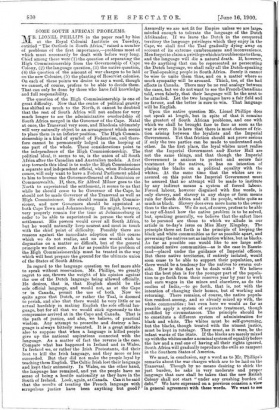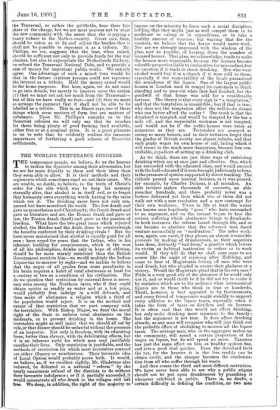SOME SOUTH AFRICAN PROBLEMS.
MR. LIONEL PHILLIPS in the paper read by him at the Royal Colonial Institute on Tuesday, entitled "The Outlook in South Africa," raised a number of problems of the first importance,—problems most of which must necessarily be dealt with before very long. Chief among these were (1) the question of separating the High Commissionership from the Governorship of Cape Colony, (2) the language question, (3) the native question, (4) the question of the amount of war charges to be laid on the new Colonies, (5) the planting of Reservist colonies. On each of these points we desire to say a word, though we cannot, of course, profess to be able to decide them. That can only be done by those who have full knowledge and full responsibility.
The question of the High Commissionership is one of great difficulty. Now that the centre of political gravity has shifted so much to the North, it cannot be doubted that the rest of South Africa will not endure for very much longer to see the administrative overlordship of South Africa merged in the Governor of the Cape. Natal at once, the Transvaal very soon, and Rhodesia ultimately will very naturally object to an arrangement which seems to place them in an inferior position. The High Commis- sionership is a kind of symbol of Federation, and there- fore cannot be permanently lodged in the keeping of one part of the whole. These considerations point to the independence of the High Commissionership. The political ideal, it seems to us, is the union of all South Africa after the Canadian and Australian models. A first step towards this ideal is to make the High Commissioner a separate and independent official, who, when Federation comes, will only want to have a Federal Parliament added to him to become the Governor-General of a Dominion or Commonwealth. If, then, Sir Alfred Milner goes to the North to superintend the settlement, it seems to us that while he should cease to be Governor of the Cape, he should not be made Governor of the Transvaal as well as High Commissioner. He should remain High Commis- sioner, and new Governors should be appointed at both Cape Town and Johannesburg. He might, however, very properly remain for the time at Johannesburg in order to be able to superintend in person the work of settlement. His powers would cover all South Africa, but he would naturally keep nearest and most in touch with the chief point of difficulty. Possibly there are reasons against the immediate adoption of this course which we do not realise, and no one would wish to dogmatise on a matter so difficult, but of the general principle we feel sure. As far as possible the problem of the High Commissionership must be treated in the way which will best prepare the ground for the ultimate union of the States of South Africa.
In regard to the language question we feel more able to speak without reservation. Mr. Phillips, we greatly regret to see, throws the weight of his opinion against the use of the Dutch language being allowed officially. He desires, that is, that English should be the sole official language, and would not, as at the Cape or in Canada, permit the use of both. Now we quite agree that Dutch, or rather the Taal, is doomed to perish, and also that there would be very little or no actual hardship in making English the sole official lan- guage, but for all that we would stick rigorously to the compromise arrived at in the Cape and Canada. That is the path of justice, and also, we believe, of practical wisdom. Any attempt to proscribe and destroy a lan- guage is always bitterly resented. It is a great mistake also to suppose that when a language is killed people give up the national aspirations connected with the language. As a matter of fact the reverse is the case. Compare what has happened in Ireland and in Wales. In Ireland we, or rather the Irish Protestants, did their best to kill the Irish language, and they more or less succeeded. But they did not make the people loyal by teaching them English. The Celtic Irish lost their language and kept their animosity. In Wales, on the other hand, the language has remained, and yet the people have no sense of being a hostile nationality as they have in the South of Ireland. Look, again, at Canada. Can it be said that the results of treating the French language with scrupulous justice have been anything but good? Assuredly we are not fit for Empire unless we are large. minded enough to tolerate the language of the Dutch Afrikander. If we leave the Dutch in the conquered territory the language privileges which they enjoy in the Cape, we shall find the Taal gradually dying away on account of its extreme cumbrousness and inconvenience. Men forget to claim a privilege which is troublesome to them, and the language will die a natural death. If, however, we do anything that can be represented as persecuting the Dutch language, we shall rally all the Dutch-speaking or Taal-speaking people in South Africa. Surely it cannot be wise to unite them thus, and on a matter where so much sympathy will be aroused. Think, too, of the bad effects in Canada. There may be no real analogy between the cases, but we do not want to see the French-Canadians told, even falsely, that their language will be the next to be attacked. Let the two languages have a fair field and no favour, and the better is sure to win. That language will be English.
Upon the native question Mr. Lionel Phillips does not speak at length, but in spite of that it remains the greatest of South African problems, and one with which we shall be brought face to face as soon as the war is over. It is here that there is most chance of fric- tion arising between the loyalists and the Imperial Government. Yet that friction should not prove serious if only the two parties can be made to understand each other. In the first place, the loyal whites must realise that the Imperial Government and- Exeter Hall are not the same things, and that though the Imperial Government is anxious to protect and. secure fair treatment for the natives, it has no intention of placing the blacks on a political equality with the whites. At the same time that the whites are re- assured on this point the Imperial Government must be assured that no attempt will be made to institute by any indirect means a system of forced labour. Forced labour, however disguised with fine words, is only slavery, and slavery in any shape or form means ruin for South Africa and all its people, white quite as much as black. Slavery does even more harm to the owner than to the slave. We do not, of course, profess to be able to say off-hand how the native problem is to be solved, but, speaking generally, we believe that the safest lines to be pursued are those to which we allude in our article in to-day's issue on Miss Mary Kingsley. The principle there set forth is the principle of keeping the black and white communities as far as possible apart, and governing the natives not as imitation whites, but as blacks. As far as possible one would like to see large self- contained native communities—as is the case in Basuto- land—placed under the guidance of Imperial officers. But these native territories, if entirely isolated, would soon cease to be able to support their population, and there would be a tendency for the natives to swarm out- side. How is this fact to be dealt with ? We believe that the best plan is for the younger part of the popula- tion to go forth from their reserves year by year to work and earn wages in the mines and elsewhere, as do the coolies of India,—to go forth, that is, not with the intention of changing their homes, but of working and returning. There remains, of course, the native popula- tion resident among, and so already mixed up with, the white communities ; but even here we would as far as possible apply a system of separate treatment, though modified by circumstances. The principle should be to constitute a different system of administration for black and white. The whites must be self-governing, but the blacks, though treated with the utmost justice, must be kept in tutelage. They must, as it were, be the infant wards of the State. If the blacks are merely mixed up with the whites under a nominal system of equality before the law and a real one of having all their rights ignored, South Africa will gradually reproduce the evils so rampant in the Southern States of America.
We must, in conclusion, say a word as to Mr. Phillips's remarks about the war charges which are to be laid on the Transvaal. Though by no means desiring to shirk the just burden, he asks in very moderate and proper language that care shall be taken that the new British Colony shall not start "under any crushing burden of debt." We have expressed on a previous occasion a view in general agreement with these words. We want to see the Transvaal, or rather the goldfields, bear their fair share of the charge, but we are most anxious not to start the new community with the sense that she is paying a heavy tribute to the Mother-country. Great care, then, should be taken so to fix and adjust the burden that it shall not be possible to represent it as a tribute. Mr. Phillips, we see, suggests that the loan, when raised, should be sufficient not only to provide funds for the war charges, but also to expropriate the Netherlands Railway, to refund the Transvaal National Debt, and to provide a Kim of money for important public works. We entirely agree. One advantage of such a mixed loan would be that in the future captious persons could not represent the interest as a tribute. Half the money raised would be for home purposes. But here, again, we do not want to go into details, but merely to impress upon the nation (1) that we must not ask too much from the Transvaal— but of this we have really no fear—and (2) that we must so arrange the payment that it shall not be able to be labelled as a tribute. This is, as Bacon says, one of those things which seem matters of form but are matters of substance. Upon Mr. Phillips's remarks as to the Reservist colonies we will only say that he vouches for there being plenty of good farming land available, either free or at a nominal price. It is a great pleasure to us to note that he evidently realises the immense importance of furthering a good scheme of Reservist settlements.







































 Previous page
Previous page